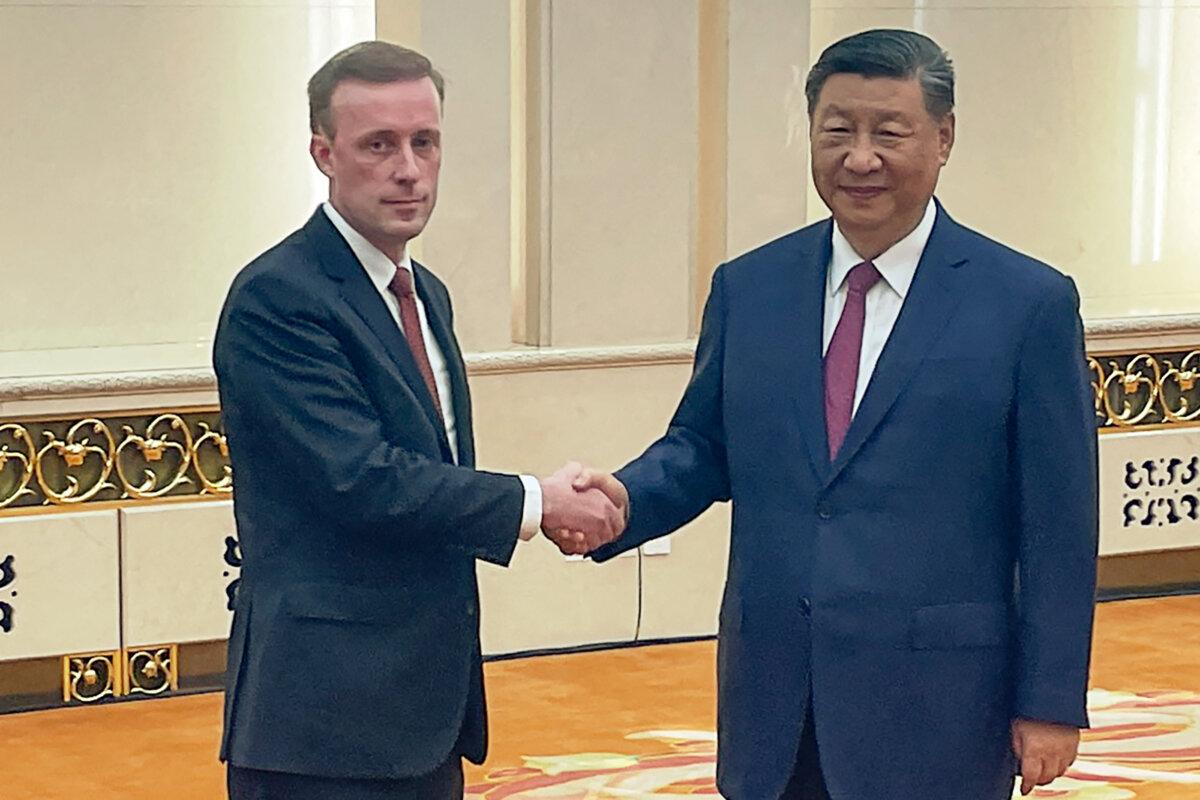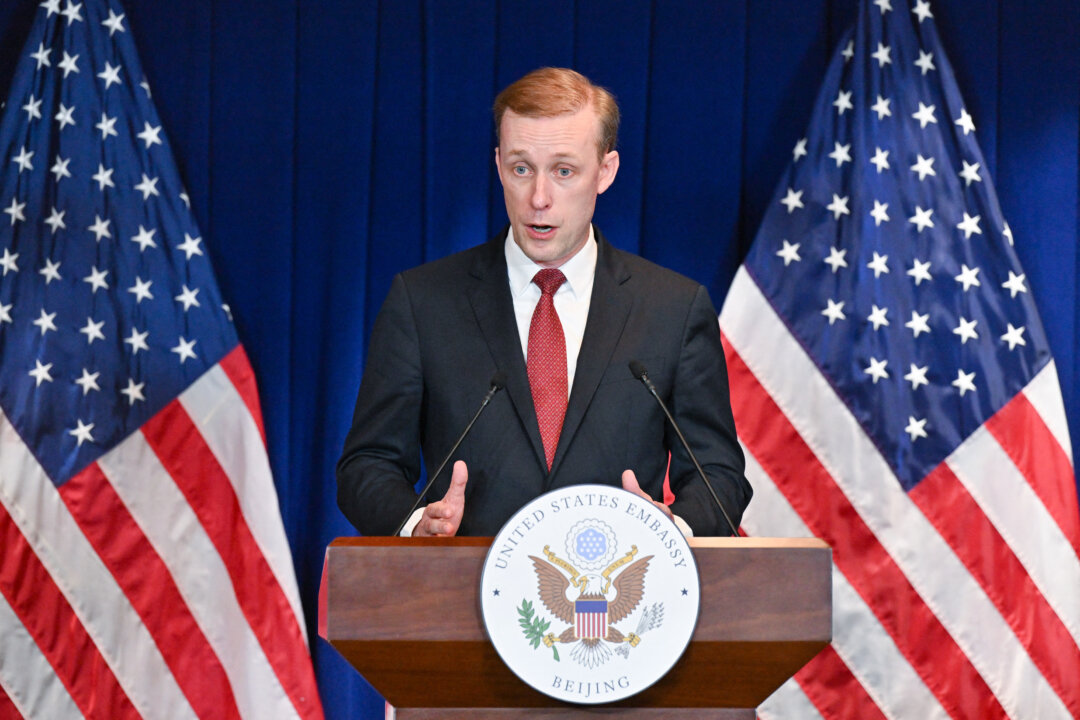The US national security adviser’s visit was to ensure that China doesn’t take advantage of ’sensitive periods’ for the United States, experts say.
News Analysis
White House national security adviser Jake Sullivan’s recent visit to Beijing aims to prevent China from taking advantage of the United States’ potential vulnerability amid two wars in Europe and the Middle East and a November presidential election at home, according to experts.
At the end of his Aug. 27–29 trip, Sullivan told reporters, “[China recognizes] that elections are sensitive periods and transitions are sensitive periods, and responsible management through an election and transition is important.
“And my visit here during this period helps contribute to try and sustain that responsible management over this coming sensitive period,” he said.
China expert Shi Shan told The Epoch Times, “Sullivan delivered his ‘don’t’ message to Beijing in person.”
Days after Hamas attacked Israel last October, President Joe Biden said “don’t” repeatedly to any countries or organizations that were “thinking of taking advantage of the situation.”
The United States and China have agreed to a call between Biden and Xi Jinping later this year. Sullivan has also hinted that in-person meetings may occur for the two leaders as both are likely to attend the 2024 Asia-Pacific Economic Cooperation Forum in Peru and the G20 summit in Brazil. Both events are scheduled for November.
Shi, who also contributes to the Chinese edition of The Epoch Times and hosts NTD’s Chinese-language program “Pinnacle View,” said establishing a call between the commanders of the U.S. Indo-Pacific Command and China’s Southern Theater Command is a big win for Sullivan.
More significant are lower-level direct communication channels as tensions rise in the South and East China Seas, Shi said. Such channels can provide timely de-escalation and prevent a spark from turning into fire.
Sullivan called the commander-to-commander call “a very positive outcome.”
The Pentagon resumed senior military talks with China in January, years after they were last held in September 2021. The Biden–Xi in-person meeting in California last November reopened the bilateral military-to-military channels.

Rising Instability
Sullivan met with senior Chinese Communist Party (CCP) leaders, including Xi Jinping, Central Military Commission vice chairman Gen. Zhang Youxia, and Foreign Minister Wang Yi, during his Beijing trip days ago. Sullivan’s visit took place as the CCP escalated its aggressions against the Philippines and Japan.
On Aug. 25, a Philippine resupply vessel ended its mission prematurely due to an engine failure after the Chinese coast guard rammed and shot it with water cannons.
On Aug. 26, a Chinese military plane violated Japanese airspace for the first time in history, according to Japan’s Ministry of Defense, amid the regime’s ramping up of military drills and aggression against its neighbors, including the Philippines and Taiwan.
At the press conference in Beijing on Aug. 29, Sullivan reiterated that public vessels and aircraft are covered by the U.S.–Philippines mutual defense treaty, which obligates the United States to respond to an armed attack on the Philippines.
The meetings involved discussions on regional stability and risks of further escalation on several fronts. Sullivan told reporters during his visit that China’s ongoing support for Russia’s defense industry would impact European and transatlantic security.
A week before Sullivan’s visit, Chinese Premier Li Qiang led a delegation to Russia, vowing to strengthen the two countries’ “all-round practical cooperation.”
At its annual summit in Washington in July, the North Atlantic Treaty Organization (NATO) declared China a “decisive enabler” of Russia in the Ukraine war due to its “large-scale support for Russia’s defense industrial base.” The civilian-military dual-use materials China sells to Russia are enabling weapon manufacturing for use in Ukraine, according to NATO.
As China monitors the United States’ global strength, it may see the wind blowing in a direction that is to its advantage, according to Shi. He identified three prerequisites for the CCP to start any military conflict in the South China Sea or over Taiwan.
One is that the United States is occupied by wars in regions other than the Indo-Pacific. Since December 2021, the United States has announced $60 billion in military aid to Ukraine, consuming a significant portion of U.S. weapon stockpiles and straining the U.S. defense industries. Since the Israel–Hamas war began last October, the United States has provided Israel with at least $12.5 billion in military aid, according to the Council on Foreign Relations.
Another of China’s prerequisites is its own capability, which China has steadily grown with increased military spending. Shi said a third condition is unrest in the United States.
“Especially during this election year, American society is highly polarized. Whoever gets in next year, the political division is severe enough to impact U.S. policies and military maneuvers,” Shi said, highlighting the importance of the time window between now and next spring.
At the press conference on Aug. 29, Sullivan said he told Beijing that interfering in U.S. elections is “unacceptable” for any nation, and he covered the topic each time he met with Chinese officials.
Last December, the Director of National Intelligence (DNI) declassified a report on Chinese intelligence’s efforts to interfere with the 2022 midterm elections. The DNI said Beijing ordered officials to ramp up efforts to influence U.S. policy and to sway public opinion in China’s favor. China-based hackers impersonated U.S. voters and used artificial intelligence to create divisive content along ideological lines during the 2022 midterms, according to a Microsoft report.

Temporary Solutions
Ping-Kuei Chen, a diplomacy professor at Taiwan’s National Chengchi University, and Arthur Ding, a professor at the Graduate Institute of East Asia Studies at the same university, told The Epoch Times that they believe Sullivan’s visit made progress at a technical and temporary level.
Chen said the U.S. government had “taken a big step in communicating” with the CCP. However, Chen noted Beijing hasn’t seen any reason to change its behavior. Based on Chen’s reading, the CCP believes it’s a victim whose economic goals are suppressed through export controls and tariffs, and whose military ambitions are curbed by a U.S.-led alliance in the Indo-Pacific.
Chen said military communication alleviates tensions but doesn’t mean cooperation. He said the fundamental differences in what the CCP and the United States want are the drivers for bilateral tensions, which are unlikely to disappear soon.
When Biden addressed the nation regarding his decision to drop out of the 2024 presidential race, he pledged to focus on foreign policy during the remainder of his term.
Ding told The Epoch Times: “[Biden] likely wishes to leave office ’safely,’ without involving America in any new conflicts. Therefore, I believe he sent Sullivan to China, hoping that China would not create any new incidents.”
Ding said the effectiveness of the new military-to-military channel remains to be seen because, without Xi’s authorization, the CCP’s military leaders wouldn’t be responsive to their U.S. counterparts. “They don’t know how to respond. Therefore, they remain silent,” Ding said.
However, he believes that, given Sullivan’s visit, the CCP is “unlikely to make any ambushing moves” before the next U.S. president is sworn in.
Michael Zhuang and Xin Ning contributed to this report.

